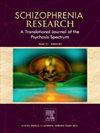Longitudinal analysis of absolute neutrophil count (ANC) variability and neutropenia incidence in African American schizophrenia patients by ACKR1 genotype
IF 3.5
2区 医学
Q1 PSYCHIATRY
引用次数: 0
Abstract
Background
About 30–50 % of schizophrenia patients are unresponsive to treatment. Clozapine is the only FDA-approved antipsychotic for treatment-resistant schizophrenia (TRS) but is disproportionally underutilized in African American populations due to concern over clozapine-induced neutropenia (absolute neutrophil count [ANC] < 1500 cells/mm3). Healthy Black individuals have a lower normative ANC, associated with the “ACKR1-null” CC genotype (SNP rs2814778) and termed Benign Ethnic Neutropenia (BEN).
Methods
To elucidate clozapine risk in this population, we characterized the natural ANC progression in 72 African American schizophrenia patients over 7-weeks to establish a necessary baseline for comparison. Weekly blood tests and TaqMan PCR genotyping were performed. Mixed-effects models (MEM) assessed ANC variability and multinomial logistic regression analyzed neutropenia incidence. Factors included ACKR1 genotype, age, sex, and study site. Medication effects (lithium, antidepressants, anticholinergics, anticonvulsants) on ANC were assessed using generalized estimating equations (GEE).
Results
51/72 participants (70.83 %) were ACKR1-null, exhibiting significantly lower ANC (2800.80 ± 1425.87) compared to the CT/TT group (4958.72 ± 1900.30) (p = 3.99 × 10−15). Neutropenia was more prevalent in the ACKR1-null group (31.4 % [16/51]) compared to the CT/TT group (0 % [0/21]) (p = 0.004), and participants with neutropenia averaged 2.1 ± 1.6 episodes over the 7-week period. Lithium was significantly correlated with higher ANC (p < 0.001). Antidepressant effects varied by genotype, increasing ANC in C-type (p = 0.007) and decreasing ANC in T-type (p < 0.001).
Conclusions
Findings suggest that nearly one-third of healthy African Americans experience neutropenia without clozapine-use. Baseline ANC resembles levels seen during clozapine, reinforcing its safety for broader utilization.
非裔美国人精神分裂症患者ACKR1基因型绝对中性粒细胞计数(ANC)变异性和中性粒细胞减少发生率的纵向分析
背景:大约30- 50%的精神分裂症患者对治疗无反应。氯氮平是fda批准的唯一用于治疗难治性精神分裂症(TRS)的抗精神病药物,但由于担心氯氮平引起的中性粒细胞减少症(绝对中性粒细胞计数[ANC] 3),在非裔美国人群中使用不足。健康黑人个体具有较低的标准ANC,与“ACKR1-null”CC基因型(SNP rs2814778)相关,称为良性种族中性粒细胞减少症(BEN)。方法:为了阐明氯氮平在这一人群中的风险,我们对72名非裔美国人精神分裂症患者在7周内的ANC自然进展进行了描述,以建立必要的基线进行比较。每周进行血液检测和TaqMan PCR基因分型。混合效应模型(MEM)评估了ANC的变异性,多项逻辑回归分析了中性粒细胞减少症的发生率。影响因素包括ACKR1基因型、年龄、性别和研究地点。使用广义估计方程(GEE)评估药物(锂、抗抑郁药、抗胆碱能药、抗惊厥药)对ANC的影响。结果:51/72例(70.83%)患者ackr1为零,ANC(2800.80±1425.87)明显低于CT/TT组(4958.72±1900.30)(p = 3.99 × 10-15)。中性粒细胞减少在ACKR1-null组(31.4%[16/51])比CT/TT组(0%[0/21])更为普遍(p = 0.004),中性粒细胞减少的参与者在7周内平均发作2.1±1.6次。结论:研究结果表明,近三分之一的健康非裔美国人在不使用氯氮平的情况下出现中性粒细胞减少症。基线ANC与氯氮平期间的水平相似,加强了其广泛应用的安全性。
本文章由计算机程序翻译,如有差异,请以英文原文为准。
求助全文
约1分钟内获得全文
求助全文
来源期刊

Schizophrenia Research
医学-精神病学
CiteScore
7.50
自引率
8.90%
发文量
429
审稿时长
10.2 weeks
期刊介绍:
As official journal of the Schizophrenia International Research Society (SIRS) Schizophrenia Research is THE journal of choice for international researchers and clinicians to share their work with the global schizophrenia research community. More than 6000 institutes have online or print (or both) access to this journal - the largest specialist journal in the field, with the largest readership!
Schizophrenia Research''s time to first decision is as fast as 6 weeks and its publishing speed is as fast as 4 weeks until online publication (corrected proof/Article in Press) after acceptance and 14 weeks from acceptance until publication in a printed issue.
The journal publishes novel papers that really contribute to understanding the biology and treatment of schizophrenic disorders; Schizophrenia Research brings together biological, clinical and psychological research in order to stimulate the synthesis of findings from all disciplines involved in improving patient outcomes in schizophrenia.
 求助内容:
求助内容: 应助结果提醒方式:
应助结果提醒方式:


